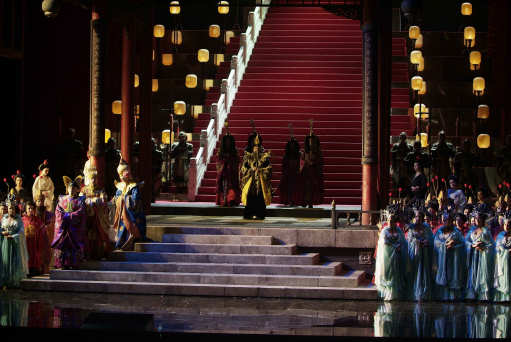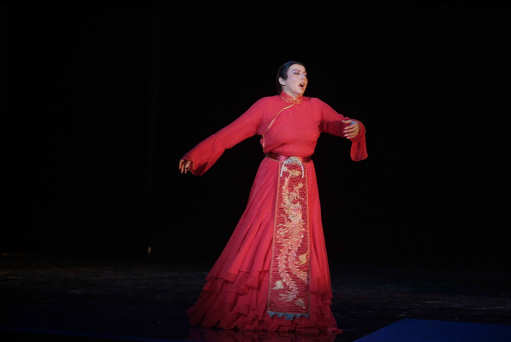Other Links
Editorial Board
- Editor - Bill Kenny
- London Editor-Melanie Eskenazi
- Founder - Len Mullenger
Google Site Search
SEEN AND HEARD INTERNATIONAL OPERA REVIEW
Puccini, Turandot: Soloists, Orchestra Comunitat Valenciana. Choir Generalitat Valenciana, Conductor: Zubin Mehta, Palau de les Arts de Valencia. 30. 5.2008 (JMI)
New
Production.
Director: Chen Kaige
Sets: Liu King
Costumes: Chen Tong Xun
Lighting: Albert Faura
Cast:
Turandot: Maria Guleghina
Calaf: Marco Berti
Liú: Alexia Voulgaridou
Timur: Alexander Tsimbaliuk

This time, the Palau de les Arts ordered a new production from the
Chinese film director Chen Kaige, who was making his debut directing
opera. It seems that Valencia has a special predilection for cinema
directors, since we also had Carlos Saura’s Carmen this season. I am
not sure that a Chinese director represents any great plus for
Turandot, any more than I believe that a Spaniard is better at
Carmen, a Catalan for Tiefland or an Andulusian for
Rossini’s Barber. What matters most is the quality of the
production.
Chen Kaige’s production achieves one fundamental requirement for
this opera however, which is that it has to be spectacular, and it
truly is. There were some beautiful and rich sets with a palace
pagoda, with huge and impressive stairs rising from the bottom of
the stage. It was interesting to see the scene of the Masks in a
full and rich settinh and not taking place simply at the its
front, so often happens. The last act is very similar to Nuria
Espert’s in Bilbao, but here there is a very quick scene change back
to the palace in all its splendour, following the love duet. There
were equally rich costumes with no less than four different dresses
for Turandot, two of them truly magnificent, while the red dress she
wore to sing “In questa Reggia” seemed more suited for a Holy Week
Procession in Spain. The direction had some slightly unconvincing
ideas, like presenting Emperor Altoum as a drunkard rather like
Herod in Salomé. On the other hand, Turandot’s appearnce
among the crowd, entering the going up the huge stairs to the palace
was every interesting. The mass movements were not particularly
attractive, with the chorus waving little flags at the solution of
the riddles. In summary, this is a spectacular production, but with
less convincing pure stage direction.

Maria Guleghina as
Turandot:
Zubin Mehta gave a glittering reading of the score. The years do not
seem to affect to the energy that he transmits and he is still able
to excite brilliant orchestral playing and to modulate the volume
of the orchestra perfectly, to support the singers. The magnificent
Valencia orchestra seems to have special devotion for Mehta, and
always rise to the occasion for him: the score used here was the
traditional one with the Alfano’s ending. The chorus was always,
powerful and musical and here we had a bright yet nuanced reading
of Turandot and not simply a show of decibels as in Bilbao
recently. Mehta had the courtesy to stop the orchestra after Nessun
Dorma but I am convinced that there are must be more intelligent
ways to imitate to Toscanini.
Turandot was soprano Maria Guleghina, who made her debut in the
role. She brought some interesting aspects to the role, like her
appearance, far better than many others singing it, her acting
ability and her beautiful voice. Somewhat less interesting was the
fact that very often she does not sing full voice. She is certainly
suited to the character, although there was some shouting and excess
decibels when she did open up.
Marco Berti was Calaf, replacing Marcello Giordani, who cancelled
for health reasons. As he did two weeks ago in Bilbao, Berti proved
once more that he is one the very few tenors able to sing the role
and this was very successful substitution. I contrast with his
performance in Bilbao, here he did not dodge the high C, which
sounded easy and bright. The rumour here is that Zubin Mehta forced
him to do this, which is more than reasonable and Bilbao might care
to take note of this. Berti was again rather short on the last
note at the end of Nessum Dorma, just like in Bilbao, which is a
pity, as I don’t believe this is due to a problem with tessitura.
Greek soprano Alexia Voulgaridou returned to Valencia, after the
poor impression she left me with as Micaela. She was better as Liú
but a long way behind Latonia Moore in Bilbao.
Ukranian bass Alexander Tsimbaliuk was a Timur short on vocal
nobility. His is a big voice, but that is not quite enough. He
also missed out the high notes in the last act , perhaps because he
did not feel well, although there was no announcement of
indisposition.
The trio of masks did not offer anything particularly interesting in
vocal terms. It was formed by Fabio Previati (Ping), Vicenç Esteve
(Pang) and Roger Padullés (Pong). In Bilbao both tenors
Atxalandabaso and Plazaola were better than their colleagues in
Valencia. Ventseslav Anastasov was a good Mandarin, whereas Javier
Agulló showed serious deficiencies at with low notes and a too
small voice as the drunkard Altoum.
Another full house with ovations during the performance for Liú and
Calaf. At the final bows, triumphal applause was dedicated to Zubin
Mehta and the orchestra. Among the singers the most applause went to
Calaf and Liú, although that is always in the script.
José M Irurzun
Pictures ©
Back to Top Cumulative Index Page
